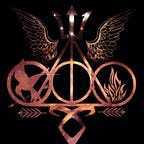What is the difference between ‘dystopia’ and ‘utopia’?
What are the contrasts between dystopia and utopia? Why is are these two considered very… distinctive?
Utopia is like ‘Paradise’ whereas Dystopia is like ‘Hell’.
You might have come across the word ‘dystopian’ or ‘utopian’ while trying out different genres of a book, well, they are different words describing the incredible yet twisted worlds; dystopia and utopia. But have you ever wondered how these two amazing genres and completely dissimilar worlds popularized and made literature more exciting to read? Well, lets find out…..
Dystopia
Dystopia is a place where all conditions of the world are opposite of the term ‘normal’. It is regarded as a very awful place to live in because of it’s dreadful and apocalyptic conditions and surroundings. It is often represented in many literary works, the themes vary and range from different types of influence of the government or the rebellions, its common theme is to depict a group of people working together.
‘Dystopia’ in Greek means ‘bad place’, it is also known by other terms such as cacotopia or anti-utopia. It was first introduced in 1818 by Jeremy Bentham as an opposite to the word ‘utopia’.
Dystopian literature typically involves governments that are tyrannical or authoritarian in nature. Among the “rules” of these ruling classes involve segregation, de-humanisation, the lack of due process or a usual justice system, or repression of ideas, religion, or other basic rights that should be enjoyed by all.
Many types of dystopian literature feature a strongman that leads the antagonist entity, and this force is the source of conflict within the story. The protagonist will be a part of the oppressed party, or would be disillusioned by the current society and would then spark a rebellion against the powerful force.
Most dystopian literature would also feature a past or ongoing calamity, whether it be a disease, war, or environmental disaster. Stories are often focused within a specific city or country, although some stories would require characters to travel to other locations of varying qualities as well.
This type of literature can be portrayed in any time-period (mostly the future). The conditions on a dystopian world may be terrible but it is mostly advanced with amazing tech. The first dystopian novel was “WE” by Yevgeni Zamyatin.
Utopia
Utopia is the exact opposite of dystopia, meaning, its conditions are absolutely favorable and highly sophisticated. The term ‘utopia’ was coined by the English philosopher Sir Thomas More based on a Greek word which means good place’ and ‘no place’. More’s book Utopia, published in 1516, describes an ideal utopian society, and his vision has ever since served as a touchstone for philosophers, public servants, and fiction writers alike. To this day, utopian studies is offered in philosophy departments at major universities.
Utopian literature is a type of fiction which takes place in a apotheosized world. The author of a utopian novel sets their narrative in a world that aligns with their broader ethos and personal philosophy. This does not mean that utopian works are free from conflict.
There are three types of utopian fiction namely; Ecological, Feminist and Technological
A few recommendations for Dystopian and Utopian fiction:
Dystopian
“1984” by George Orwell
“The Handmaid’s Tale” by Margaret Atwood
“The Time Machine” by H.G. Wells
“The Hunger Games” by Suzanne Collins
“Divergent” by Veronica Roth
“The Maze Runner ” by James Dashner
Utopian
“Dispossessed” by Ursula Le Guin
“A Modern Utopia” by H.G. Wells
“News from Nowhere” by William Morris
“Looking Backward: 2000- 1887” by Edward Bellamy
“Gulliver’s Travels” by Jonathon Swift
